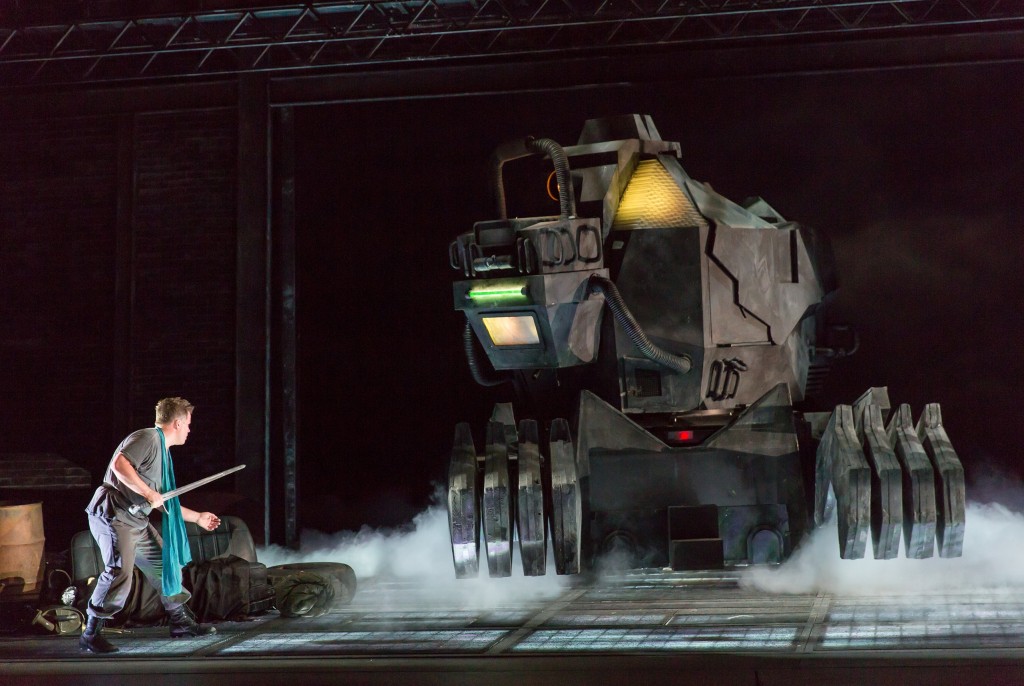In the third installment of the Washington National Opera’s mammoth staging of Richard Wagner’s “The Ring of the Nibelung” at the Kennedy Center, a new Brünnhilde awakens, Fafner’s dragon turns out to be more of a monster truck, and the titular star of the work, “Siegfried,” turns out to be much more of a jerk than you’d ever want him to be.
After the heights of “The Valkyrie,” and its soaring, well-known themes, much of the third opera in Wagner’s epic work is dark and dour stuff.
The decline of the era of giants and gods coincides with the decline of nature in artistic director Francesca Zambello’s version, so Michael Yeargan’s sets reflect the detritus of rail-side industry in mid-20th century America.
That’s most striking in the opening act, with a rotting trailer alongside the outdoor forge of Mime (American tenor David Cangelosi), the brother of Wotan (American bass baritone Alan Held).
These individual operas may seem long (at 5 hours, a flight to Los Angeles is shorter), but the time passage in between them is immense: Eighteen years have passed since the end of “The Valkyrie” (though it only seems like Monday). By Wednesday, the baby that the now dead Seiglinde thought she was pregnant with, has grown into the title character (American tenor Daniel Brenna), a boorish warrior that Mime, not seen since the opening opera of the cycle, “The Rhinegold,“ is raising with an ulterior motive – to get the gold ring barely mentioned in “The Valkyrie.”
To do that means forging the mighty sword that had been shattered a generation back.
So there’s a lot of singing about munitions and greed in tenor voices in Act One. When Wotan comes along disguised (in a hat!) as a Wanderer, he adds some bass-baritone too.
Things don’t lighten up much in Act Two, where the den of the dragon Fafner is actually a garage, and the creature, when it finally appears, is a kind of growling Transformer with backhoe claws.
Anyway, Siegfried’s sword makes sparks whenever it hits the machine and when Fafner himself (D.C. bass Soloman Howard) comes out, with his Freddie Kruger fingers, he is slain as well.
Sieg grabs the gold, almost as an afterthought. He is more interested in a woman sleeping in a ring of fire, foretold to him by a forest bird flitting in the garage rafters.
As little as she appears, it’s may be tough to appreciate how welcome this forest bird is, for both the brash warrior and the gathered audience. In the role, American soprano Jacqueline Echols not only brings the first female voice of the night, but also the first dash of color – Catherine Zuber’s costumes had been so dark and similar to that point it was hard to distinguish between Wotan and Alberich (American baritone Gordon Hawkins) depicted as a kind of all night industrial security guard.
Two other women enliven the final act – earth goddess Erda (American contralto Lindsay Ammann) rising from a sleep that has kept her out of the picture since “The Rhinegold,” and most spectacularly, Brünnhilde.
Awakening Brünnhilde from her sleep from within a ring of fire would be fraught with plenty of drama anyhow, but in this case it was also the dramatic debut of British soprano Catherine Foster who was meant to play the role in two of the three cycles anyway.
But after twisting a leg in rehearsal a week before the opening, Foster had been replaced by American soprano Christine Goerke for the opening night of “The Valkyrie” Monday.
Because there was less movement and a shorter period of time she was on stage in “Siegfried,” Foster was allowed to retain the role with some grandeur. She even seemed to be even playing up the injury a bit by seeming to be unsure on her feet at first – something that also might naturally affect someone who had been sleeping on a rock for 18 years.
Her voice was in top shape, though, and even seemed to up Brenna’s game as well. It was an odd little dance they had, however, unfolding like everything in Wagner’s 1876 mindset, very slowly.
It’s not just the handsome Prince awakening Snow White with a kiss; there’s a lot more cat and mouse play here. And, I suppose, understandably so: Brünnhilde was older than Siegfried’s mother when the latter was pregnant with him. Eighteen years of beauty sleep might have slowed her aging somewhat, but come on. Valkyries will talk. And isn’t Brünnhilde, as daughter of Wotan, half-sister of Sieggy’s parents, the guy’s aunt once removed?
At any rate, “Siegfried,” conducted masterfully once more by music director Phillippe Augin, ends on a high note. With Foster’s stirring voice comes, for the first time in the whole cycle, high strings, and suddenly, it seems that with the age of giants and the age of gods both in demise, the skies are starting to clear for the Gotterdammerung – “Twilight of the Gods” and final opera of the piece.
It’s assumed Foster will resume the role from here on out, but not in the third and final cycle of the staging later this month. That’s when, by previous arrangement, Swedish soprano Nina Stemme will step into the role.
That’s right: For the WNO, it ain’t over until the third Brünnhilde sings.
Siegfried will be repeated May 13 and 20 at 6 p.m. at the Kennedy Center. The Washington National Opera’s Ring cycle continues through May 22.
